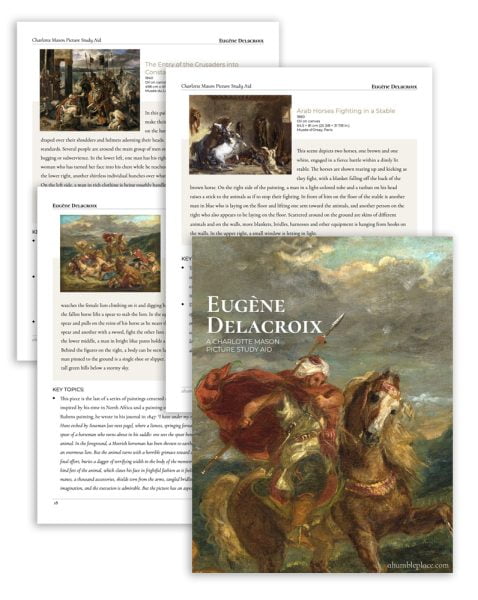Commonplacing: The Work is Not Ours (Celebration of Discipline)

It is very helpful to read with a commonplace book or reading-diary, in which to put down any striking thought in your author, or your own impression of the work, or of any part of it; but not summaries of facts. Such a diary, carefully kept through life, should be exceedingly interesting as containing the intellectual history of the writer; besides, we never forget the book that we have made extracts from, and of which we have taken the trouble to write a short review.
Charlotte Mason – Formation of Character, p. 260
For more information on the Commonplacing posts, click here.
When we despair of gaining inner transformation through human powers of will and determination, we are open to a wonderful new realization: inner righteousness is a gift from God to be graciously received. The needed change within us is God’s work, not ours. The demand is for an inside job, and only God can work from the inside. We cannot attain or earn this righteousness of the kingdom of God; it is a grace that is given.
Richard Foster – Celebration of Discipline, p. 6
If we are to progress in the spiritual walk so that the Disciplines are a blessing and not a curse, we must come to the place in our lives where we can lay down the everlasting burden of always needing to manage others. This drive, more than any single thing, will lead us to turn the Spiritual Disciplines into laws. Once we have made a law, we have an ‘externalism’ by which we judge who is measuring up and who is not. Without laws the Disciplines are primarily an internal work, and it is impossible to control an internal work. When we genuinely believe that inner transformation is God’s work and not ours, we can put to rest our passion to make others right.
Richard Foster – Celebration of Discipline, p. 10 (emphasis mine)
I took most of last year to read Celebration of Discipline by Richard Foster after Nancy Kelly mentioned it during one of her talks at the Charlotte Mason Educational Retreat in February. I first borrowed it from a friend, not really sure that I’d care for it based on the title alone (which honestly sounded a little puritanical), and then eventually buying my own copy so I could underline, highlight, and dog-ear at will. This book is full of wisdom, guidance, and goodness and in many ways, solidified a few things that I had been pondering at the time.
These two quotes are found in the very beginning of the book and were a powerful way to dive into Foster’s words. In many ways, by prefacing the spiritual disciplines with these two ideas – that we are not the driving force of our own inner transformation or those of the people around us – he takes a bit of the pressure off. Oftentimes, I go into books like this a little wary as I assume there will be suggestions for completely impractical ways for a homeschooling mother of two young children with a side business to grow her own spirituality. But this book felt different. He does offer ideas for spiritual growth, but they’re practical for just about anyone, especially if you keep these two quotes in mind when considering those suggestions.
I think sometimes I need to hear a concept many times and at many different places in my life for it to finally sink in. The idea that inner transformation work is done by God and not by me is not a new one, but knowing it and really, truly embracing it are two separate things.
I think what also helped me finally begin to embrace it is the fact that reading this book came on the tail-end of the retreat which included another talk given by Nancy. At the end of her presentation, she took questions and they ranged anywhere from suggestions for books on a specific subject to how to schedule our lesson time. There was one in particular that stood out to me, however, in which the attendee asked how we can be sure that this feast is sinking in. How do we know that the things we’re reading to our kids are sticking? How can we feel confident that they’re actually learning something?
I think this is something that we struggle with often, especially as Charlotte Mason homeschoolers. We generally don’t do tests in the traditional sense (except in cases where it’s required by our state) and while narration and end-of-term exams can give us an idea of what is actually being retained, it’s difficult to let go of the voices that permeate our educational culture, demanding that our kids remember dates and names and specific facts. We already have so many pressures on us as homeschoolers from family members, friends, and neighbors who don’t necessarily understand why we’re doing this weird homeschooling thing. And to not be able to actually PROVE to them on their terms that this weird homeschooling thing is, in fact, working, can be a struggle.
Nancy’s answer to the woman’s question wasn’t what I expected, though. I think I prepared myself for suggestions of tests that could be applied. Questions that could be asked. Papers that could be written. Or at the very least, something along the lines of using narration to gauge comprehension.
But instead, Nancy went right to the heart of Charlotte Mason’s ideas and said, “you have to trust the Holy Spirit.”
…God the Holy Spirit is himself, personally, the Imparter of knowledge, the Instructor of youth, the Inspirer of genius…
Charlotte Mason – The Great Recognition
Admittedly, I didn’t like that answer. Isn’t it a given, as Christian homeschoolers, that we trust the Holy Spirit, not just in our homeschool, but in all areas of life? What can we do with that, though? What’s something practical I can do to prove that my kids are learning? What is something tangible that I can plan out and include in our schedule to make sure we’re making progress? What in the world does a homeschooling mom do with advice like that?
And obviously I completely missed the point.
I missed the point because I was looking at education in the wrong way. Education is not memorization of rote facts, dates, names, places. It is not knowing multiplication tables by heart or passing a specific test. It’s not regurgitating whatever information was just fed to a student. While knowing facts is not necessarily a bad thing in and of itself, it is not education. Education is actually far simpler, yet for deeper than any of these things.
…the function of education is not to give technical skill but to develop a person…
Charlotte Mason – Towards A Philosophy Of Education, p. 147
Laurie Bestvater, in her book, The Living Page, also hints at this:
…we expect children to grow by giving disembodied information and requiring parrot answers (especially in the Church) instead of arranging a diet rich in living ideas that might be less within our control but which might reflect the work of the Holy Spirit who is like the wind that comes and goes at will. (p. xiv)
When you look at education from this point of view, the voices, whether they’re yelling inside your head or are coming from people around you, get a little quieter. The need to prove and quantify seems a little less important, but the desire to help your children thrive in their individuality and grow as human beings seems a little more important.
Along these lines, Ms. Mason also says:
…we are empirically certain that a chief function of education is the establishment of such ways of thinking in children as shall issue in good and useful living, clear thinking, aesthetic enjoyment, and, above all, in the religious life.
Education is not just about knowledge and accumulating facts. It’s about growing as people and becoming more of who we were created to be. It’s about your kids becoming more of who they were created to be. The beauty of this, though, is that the work in this growth really does belong to them and to God. We can offer these wonderful, living books, we can lay out schedules and enroll in piano classes, we can be part of co-ops and plan wonderful handicrafts. But the internal work, the development of a person, rests on the Holy Spirit and this is true both of the spiritual life and the educational life. He will do the work. We need to rest in that.
In her book, Teaching from Rest, Sarah Mckenzie puts this concept so eloquently:
It’s easy to forget that teaching is holy work. We forget that building up the intellect — teaching our children to really think — does not happen by the might of human reason, but rather by the grace of God. On an ordinary day, you and I likely have a set of tasks we’ve scheduled for our kids. But it’s more than math. It’s more than history. It’s the building up of our children’s minds and hearts, and we can only do that if we realize that this is how we thank Him for the graces He so lavishly pours out on us.
The beauty of all of this, also, is that we don’t have to teach or raise our kids with a sense of panic that we won’t get them to say the right prayer or think the right way. We don’t have to bring them up in our own fear. God is far more capable than we give him credit for. He knows what’s best for these little people He has given us and He knows what the future holds for them. He knows how to speak to their hearts and minds. He knows what they need most.
So as I go into a new school year with no small amount of anxiety (because that’s a normal state of being for me), I am comforted and encouraged by the idea that the work isn’t mine. I can offer the feast, but the real work, the true transformations and learning, will be done by the God of the universe.
Effect? Influence? Utility? Let a man do his Work; the fruit of it is the care of Another than he.
Thomas Carlyle









“You have to trust the Holy Spirit.” That is so true, and thank you for the reminder. I was having a stressful time with my blog redesign as I was “sprinting”. My baby was carrying the same book around for quite some time, and I finally read it. The message hit home … Slow and steady wins the race.
That’s so true, Renee!
Beautiful reminder, Rebecca. The anxiety has grown as my kids get older and the stakes get bigger. Laying them in the hand of the Father and trusting also gets harder, but exponentially more necessary.
Yes.. I think I will need to put these quotes and CM’s Grand Recognition in several prominent places all over my home as they get closer to their teen years!
Preach. Just what I needed to read tonight.
Thank you Rebecca, this has exactly what my heart needed tonight. Your words are a true blessing <3